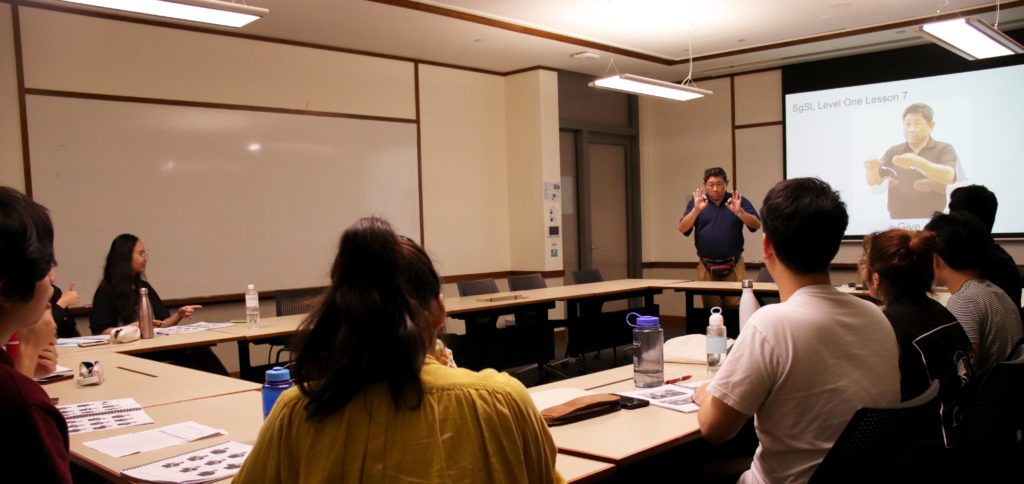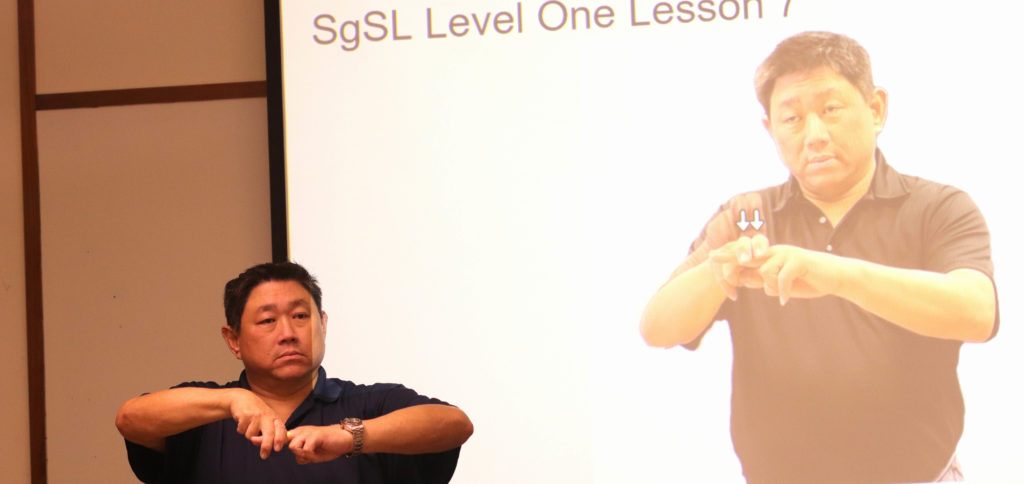Sign Language module offers students unique learning opportunity and insight on Deaf culture
 Beginning Singapore Sign Language is a new course at Yale-NUS College this semester, taught by Singapore Sign Language instructor Mr Dennis Tan from the Singapore Association for the Deaf. Image by Joshua Vargas for Yale-NUS College.
Beginning Singapore Sign Language is a new course at Yale-NUS College this semester, taught by Singapore Sign Language instructor Mr Dennis Tan from the Singapore Association for the Deaf. Image by Joshua Vargas for Yale-NUS College.
When Xie Yihui (Class of 2023) sent the first email asking about the possibility of Yale-NUS College offering a beginner-level Singapore Sign Language (SgSL) module, she did so more out of hope than expectation.
Deputy Director of Language Studies and Senior Lecturer of Humanities (Spanish) Dr Eduardo Lage-Otero asked her to run a Facebook poll to see how many students would be interested in such a module. Yihui did not think more than 10 students would indicate interest.
Over 80 students, however, expressed interest in the module.
“It was already pretty late in the module registration process, and I thought that most of the classes would already be confirmed,” Yihui said. “I was just trying my luck.”
A few weeks later, Yihui received news that the module had been approved. In January 2020 when the semester began, the first lesson of a 2MC (Modular Credit) introductory Singapore Sign Language module was held with a class of 17 students.
Sign language is particularly meaningful to Yihui, who never learnt it growing up despite being hard of hearing herself. She recently became familiar with the Deaf community in Singapore and the struggles that they were facing.
“Many of them are campaigning to have Singapore Sign Language recognised as an official language in Singapore,” Yihui revealed. “The challenge is not that people don’t know sign language, but that people aren’t aware it is a legitimate form of communication.”
The module has proved meaningful to its other students as well. For Hun Savong (Class of 2023), learning Singapore Sign Language provides him a useful skill that he hopes to use in the future. “I plan on doing community service in the future to help people that are hard of hearing or have communication handicaps”, he said.
Yet, the nuances of the language have also appealed to him. Savong recalled one instance during a session when the class instructor demonstrated to him the sign for his home country, Cambodia. “It looked like he was tying and tightening a Krama, our traditional garment, around his waist, which instantly conjured the image of a Cambodian rice farmer in my head. I was fascinated by how such a simple gesture could show the identity of my country,” Savong said.
For Grady Ng (Class of 2020), a Psychology major working on his capstone project, learning sign language was a way to approach his academic interests from a new perspective. “My research interests are mostly about how to design intuitive interfaces by studying the way we conceptualise our environment, and language is one of the many things that affects that,” Grady said. “Even more so if your language happens to use visual and manual communication extensively.”
 Mr Dennis Tan’s class takes a “no-voice” approach to teaching, where the class is taught entirely using Singapore Sign Language. Image by Joshua Vargas for Yale-NUS College.
Mr Dennis Tan’s class takes a “no-voice” approach to teaching, where the class is taught entirely using Singapore Sign Language. Image by Joshua Vargas for Yale-NUS College.
The class is taught by Singapore Sign Language instructor Mr Dennis Tan from the Singapore Association for the Deaf. His lessons take a “no-voice” approach to teaching, where the class is taught entirely using Singapore Sign Language.
“It’s been incredibly rewarding and interesting,” Grady said. “It was tough not being able to rely on speech the same way I relied on English to learn other languages, but I found that it really helped me engage with the language and understand its grammar.”
This is not the first time a language has been added to the curriculum when requested by a student. For example, Dr Lage-Otero recalled an earlier instance when an Anthropology student wanted to learn Bangla to conduct research for his capstone project. “He talked to Professor Cecilia Coale Van Hollen, Head of Studies of Anthropology, about his research interests, and with her strong endorsement, we were able to offer it via teleconference from India,” Dr Lage-Otero said.
Yihui is very appreciative of the College’s willingness to offer the module. “I think the College is pretty supportive whenever students want to organise anything on campus, and I think this is really important,” she said. “Especially since there isn’t much social discourse about Sign Language and the needs of Deaf people going on in Singapore.”
Sure enough, the students have found learning sign language particularly enriching to their understanding of Deaf culture. Grady remarked, “Engaging with sign language itself does give a sense of how the experience is like.”
“With that knowledge, I hope to bring in some elements of accessibility and inclusivity into my design and my research,” he said.
Watch the video of the Beginning Singapore Sign Language class here.





